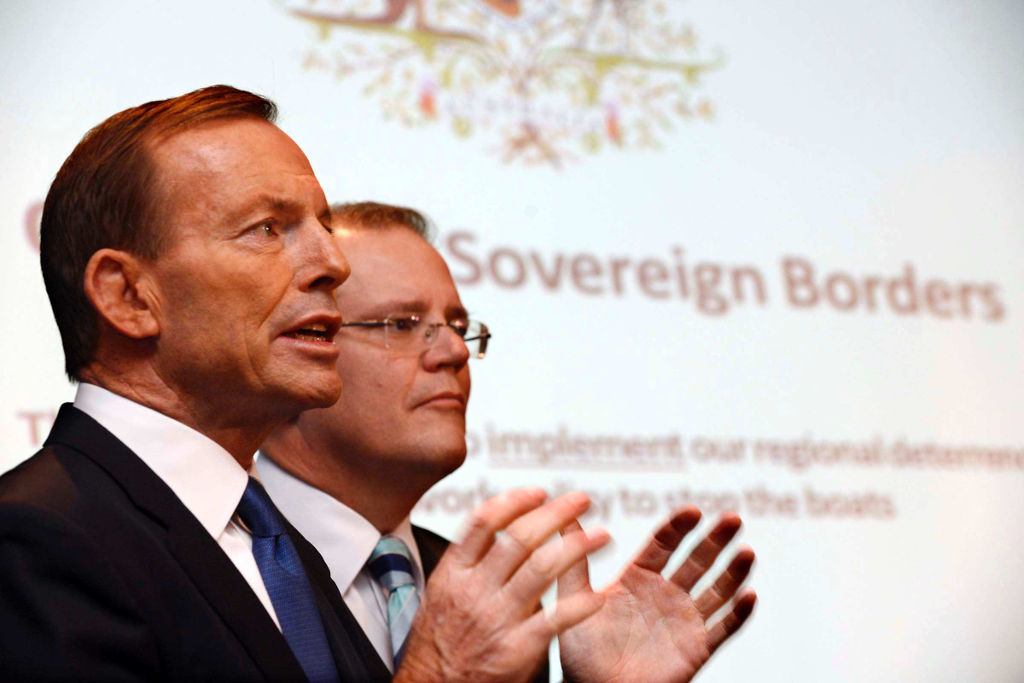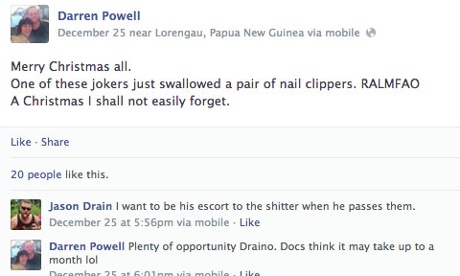Why The Coalition’s Hush-Hush Policy Isn’t Working (And Why That Doesn’t Even Matter)
Morrison and Abbott’s policy of obfuscation is ludicrous for a number of reasons, but mostly because it simply won’t work.

Since the 2013 election that delivered the Coalition to power, Tony Abbott and his Minister for Immigration and Border Security, Scott Morrison, have framed the long-raging, soul-draining battle for the sanctity of our island nation in distinctly militaristic terms. As part of this approach, the Coalition has sought to shroud the activities of Operation: Sovereign Borders in a veil of secrecy — but aside from fulfilling some adolescent Tom Clancy fantasy, what exactly is the point?
Conceptually, it clearly fits into the broader bipartisan push to frame the asylum seeker issue not as a humanitarian one, but as a military one: we are at war, defending our way of life. From an amoral, purely political perspective, it’s easy to see the upside of using war metaphors to justify a tight control on information. But what I can’t understand is how all the James Bond top-secret make-believe is going to actually help the cause of those that would seek to stop the boats — especially when the people smugglers themselves know more about what’s happening to them than the voting public. Morrison and Abbott’s policy of obfuscation is ludicrous for a number of reasons, but mostly because it simply won’t work.
In the last four years, we’ve seen the en masse leaking of diplomatic cables, and the real newshounds among you might recall the recent uncovering of the largest covert surveillance program in history. The world of international diplomacy is a byword for discretion, and the NSA are the most secretive, paranoid, encryption-happy government agency anywhere. In liberal democracies with a free press and a tradition of robust parliamentary debate, though, things tend to get out. For examples, see the Profumo Affair, Watergate, Iran–Contra, Tangentopoli, Whitewater, Monica Lewinsky, Yellowcake forgery, the Plame Affair, Jack Abramoff, the AWB scandal, Cornelia Rau, Muhamed Haneef, and the Pink Batts scandal.
Operation Sovereign Borders has become synonymous with breaches of secrecy and of security – impropriety from contractors, anonymous tips, whistleblowers, misinformation and possibly criminal negligence – and everything suggests that it will join the above scandals on the roll call of infamy. So what exactly is the Australian government thinking?
Journalists: A Naturally Curious Bunch
If Abbott, Morrison and their ilk were serious about discretion, they might start by cooling public interest in the in the activities of the coastguard, the navy and the contractors that manage Australia’s detention centres. Of course that would mean the Coalition would sacrifice the opportunity to make political capital out of the issue. So what we have instead is a pick-and-choose approach: we get full disclosure when it suits, and the invocation of operational security when it doesn’t. Unfortunately for them, though, nothing makes a journalist more curious than withheld information.
When contacted for this piece, a journalist covering Manus Island suggested that the Coalition simply don’t understand the fundamental principles of governance in the information age: that any government claim of omniscience is easily undermined. They also said that the absence of reliable government information made no difference to their coverage, beyond offering encouragement that there was some dirt to be found.
For obvious reasons of potential bias, good journalists don’t take government statements at face value — nor do they take the reports of refugee advocate groups with anything but an oversized pinch of salt. I was told that reports emanating from Manus Island are sourced directly from detainees, via social media or phone contact. Contrast this with the highly unreliable lines of communication that run between G4S and the minister’s department, and Morrison’s arrogance in lecturing the press about unfounded rumours seems breathtakingly misplaced. “The government presents itself as being continually right,” the journalist said, “but we’ve had instances where we’ve known more than they have.”
Those instances have been numerous. For example, when questioned about the minors that had been mistakenly transferred to Manus Island in November, Morrison categorically denied the report, only to retract his denial when it transpired that he had received incorrect information from within his department. An identical sequence is being played out following last week’s Manus Island riots: Morrison shows blind faith in government-contracted personnel; Morrison is later forced to admit his error in apportioning said blind faith; finally, a third party reveals the true extent of the wrongdoing by those within Morrison’s portfolio.
Morrison Is At The Top Of An Unwieldy Chain Of Command
As well as the detainees themselves, there are potential leakage points among the men and women of the navy, the coastguard, and the corporations involved with the operation of both onshore and offshore detention centres, such as Serco, G4S and Transfield.

These are people with Facebook accounts, Twitter accounts, mobile phones and internets. These are people that may agree with the government policy, but lack the government’s enthusiasm for Byzantine intrigue; people who may harbour even greater disdain for asylum seekers than the government; and people who may have carried out turn-back orders or worked in detention centres, seen their innate cruelty, and experienced a crisis of conscience.
To expect the thousands of people that populate the chain of command, both military and civilian, to bite down hard on the flesh of their collective tongue and stay silent is optimistic at best. To expect that of disillusioned former employees is simply ludicrous.
–
Rank Hypocrisy Tends To Undermine One’s Objectives
It’s the Coalition itself, though, with a King Canute-esque confidence in its ability to control the flow of information, which is the weakest link in this slipshod chain.
Morrison, Abbott, and Minister for Defence David Johnston have been all too happy to break operational secrecy to trumpet the success of their policies or to reflexively defend government operatives, but they’ve slipped back behind the shroud of conspiratorial doubletalk when it’s more convenient to do so.
The two impulses have mingled in ever-tighter circles, a slow dance of second-rate Machiavellian hypocrisy that a spoilt child would be ashamed of. Last week this process reached is logical denouement when Morrison attempted to gain political capital from the death of 23-year-old Iranian Reza Berati: proffering the deceased as a warning to Australian citizens about the sort of people that they are being protected from, and as a warning to asylum seekers as to the consequences of dissent. After all, in breaking out of the Manus Island facility, Berati and his fellow detainees brought trouble on themselves.
If Morrison had known then what he knows now – that G4S had actually assisted PNG residents in breaking into the detention centre, that Berati was a model detainee who was killed within the Manus Island facility, and that Morrison himself had failed in his duty of care to Berati – he mightn’t been quite so quick to use the loss of a human life for propaganda purposes.
What we’re seeing is the logical result of the most ill-thought-out, shambolic political strategies that the Australian public has ever had to cringe through. The weirdest thing about the policy of obfuscation, though, is that it’s completely unnecessary: for the Coalition, it doesn’t really matter if any of these horrific stories emerge. In fact, as Liz Thompson explains in the above clip, for offshore processing to work as a deterrent, these horrific stories have to emerge. “[Manus Island] is not designed as a processing facility, it’s designed as an experiment in the active creation of horror to deter people from trying in the first place,” she explains. “That’s why I say again that Reza Barati’s death is not a crisis for the department. It’s actually an opportunity – it’s an opportunity to extend that logic one step further, to say: ‘This happens.’” Sure, the part of the populace that is ashamed of the policy will voice their objections, but as long as no-one in parliament is taking up their cause, then it all amounts to very little.
And sadly, that’s where we’re at. Any opposition party worth their salt would be having an almighty field day with all this, but that’s not something that the Australian people have at their disposal. Having decided to out-hardline the Coalition by unveiling the Manus Island policy prior to the 2013 election, Labor share culpability for the human cost of offshore processing, which still sounds like something that you’d do to anchovies, not people. Indeed, the only real objection that the opposition can raise with the Abbott government is that they are failing to carry out their shared policy objective with sufficient vigour.
–
The Tattered Veil Of Secrecy: A Timeline
18 September 2013: Operation Sovereign Borders commences.
8 October; 11 October 2013: Morrison willingly provides information on criminal activity by asylum seekers living in the community; Morrison then refuses to respond to reports of self-harm by asylum seekers living in detention.
4 November 2013: Morrison denies claims that two unaccompanied minors were incorrectly transferred to Manus Island – claims that were subsequently proven.
20 December 2013: Official transcript of Sovereign Borders press conference – in which journalists ask about reports of “numerous unsafe practices and gross departures from generally accepted medical standards” – records 23 questions from journalists as ‘inaudible’. Strangely, The Guardian are able to catch every word, and offer their transcript to the Minister’s Office. They receive no reply.
2 January 2014: Morrison offers no comment in response to allegations of sexual assault on Manus Island.
7 January 2014: Morrison refuses to confirm or deny reports of asylum seeker turn-backs.
9 January 2014: Cost of a Nauru journalist visa increases from $200 to a non-refundable $8000.
13 January 2014: A Freedom Of Information request regarding immigration department meetings is denied.
14 January 2014: Morrison announces that his weekly press briefings will be scrapped.
16 January 2014: Morrison denies reports of shots being fired by naval personnel, but refuses to elaborate.
22 January 2014: Morrison denies allegations of naval cruelty towards asylum seekers. Defence Minister David Johnston echoes the denial, but refuses to elaborate on what he describes as a civil matter. Tony Abbott describes the claims as ‘sledging’.
24 January 2014: Morrison issues statement announcing that no boats have arrived in Australia for 36 days, but does not offer information regarding boat turn-backs.
30 January 2014: Draft of information pack for asylum seekers leaked.
16 January; 17 January; 14 February 2014: Morrison promises not to violate Indonesia’s territorial sovereignty; Morrison admits to accidental naval incursions into Indonesian waters, but refuses to elaborate on the details; a leaked Indonesian naval document duly elaborates on the details.
19 February 2014: The Department of Immigration accidentally publishes the personal details of almost 10,000 asylum seekers on their website.
22 February; 25 February 2014: Morrison releases a statement acknowledging that previous reports on the Manus Island detention centre riot were innacurate. At 8.45pm. On a Saturday night; A leaked immigration department document reveals further information that was omitted from the second statement correcting the first statement.
25 February 2014: Evidence emerges from Manus Island of journalist intimidation by Papua New Guinean police, G4S employees and Australian officials, as well as a lack of due process regarding the post-mortem handling of Reza Berati. A former migration agent stationed on Manus Island blows the whistle on the “ridiculous” administration of the facility, describes it as “an experiment in the active creation of horror”.
–
Edward Sharp-Paul is a writer from Melbourne. He tweets from @e_sharppaul.